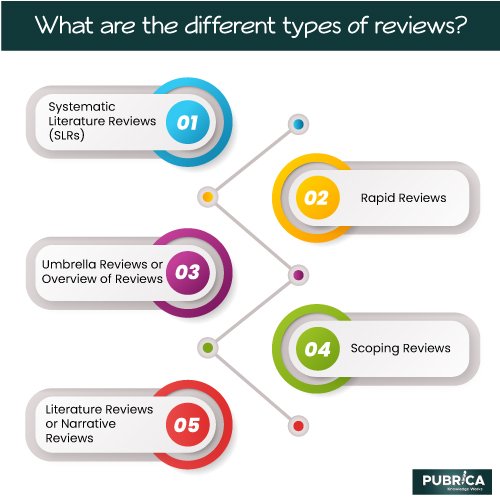What are the different types of
reviews?
What are the different types of reviews?
Abstract:
There are several sorts of evidence synthesis efforts, such as systematic reviews and others. The study topic entirely determines the type of review used. However, not all research questions lend themselves nicely to systematic reviews.
Pubrica assists users in completing various types of reviews. Below is a quick summary of some of the most prevalent review categories.
Systematic literature reviews (SLRs) : SLRs attempt to compile all empirical evidence that meets pre-specified eligibility criteria in order to address a specific, well-defined research question. An SLR employs explicit and reproducible systematic procedures to eliminate bias, resulting in more reliable findings from which inferences and judgments may be taken.
Rapid reviews : Rapid reviews try to generate a rigorous synthesis in a short period (due to time constraints/urgency) based on a pre-defined research issue. The quick review methodology is similar to a regular, systematic review in that the emphasis is on reproducible pre-specified search and screening procedures that reduce the likelihood of bias; however, it may not be as severe as a formal systematic review.
Umbrella reviews or Overview of reviews : An umbrella review is a meta-analysis of many systematic reviews. The procedure searches for and identifies systematic reviews on similar research problems in the same topic area using clear and systematic methodologies. An umbrella review aims to aggregate the findings of systematic reviews across key outcomes.
Scoping reviews :Scoping reviews are exploratory and often address a broad subject, as opposed to systematic reviews, which typically address a more specific question.
Literature reviews or narrative reviews :Literature reviews, also known as narrative reviews, give an overview of what is known about a specific topic. For example, they analyze the information rather than just restating it, although the methods they apply are rarely mentioned and are not detailed in depth in the review. The search may be extensive, but it is not intended to be exhaustive.

Reference:
Grant, Maria J., and Andrew Booth. "A typology of reviews: an analysis of 14 review types and associated methodologies." Health information & libraries journal 26.2 (2009): 91-108.
Give yourself the Medical edge today
Each order includes
- On-time delivery or your money back
- A fully qualified writer in your subject
- In-depth proofreading by our Quality Control Team
- 100% confidentiality, the work is never re-sold or published
- Standard 7-day amendment period
- A paper written to the standard ordered
- A detailed plagiarism report
- A comprehensive quality report

